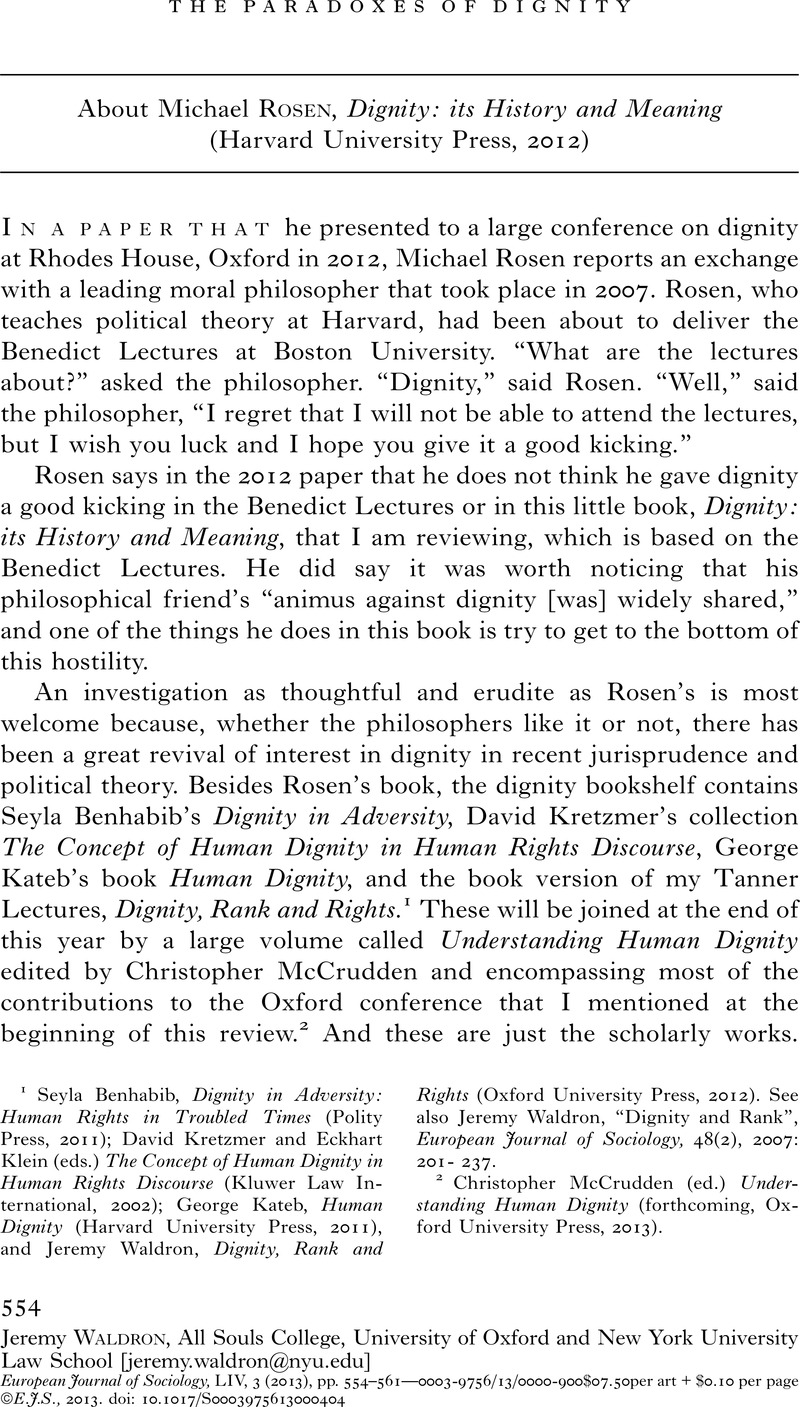Article contents
The Paradoxes of Dignity - About Michael Rosen, Dignity: its History and Meaning (Harvard University Press, 2012)
Published online by Cambridge University Press: 22 January 2014
Abstract

- Type
- Book Reviews
- Information
- European Journal of Sociology / Archives Européennes de Sociologie , Volume 54 , Issue 3 , December 2013 , pp. 554 - 561
- Copyright
- Copyright © A.E.S. 2013
References
1 Seyla Benhabib, Dignity in Adversity: Human Rights in Troubled Times (Polity Press, 2011); David Kretzmer and Eckhart Klein (eds.) The Concept of Human Dignity in Human Rights Discourse (Kluwer Law International, 2002); George Kateb, Human Dignity (Harvard University Press, 2011), and Jeremy Waldron, Dignity, Rank and Rights (Oxford University Press, 2012). See also Jeremy Waldron, “Dignity and Rank”, European Journal of Sociology, 48(2), 2007: 201- 237.
2 Christopher McCrudden (ed.) Understanding Human Dignity (forthcoming, Oxford University Press, 2013).
3 Donna Hicks and Desmond Tutu, Dignity: Its Essential Role in Resolving Conflict (Yale University Press, 2013); Harvey Max Chochinov, Dignity Therapy: Final Words for Final Days (Oxford University Press, 2012); Rosalie de Rosset, Unseduced and Unshaken: The Place of Dignity in a Young Woman's Choices (Moody Publishers, 2012); and Richard Curwin, Allen Mendler, and Brian Mendler, Discipline with Dignity: New Challenges, New Solutions (Association for Supervsiion and Curriculum Development, 2008).
4 On this point, Rosen cites the well-known critiques of Ruth Macklin, “Dignity is a Useless Concept”, British Medical Journal, 327 (2003), 1419 and Steven Pinker, “The Stupidity of Dignity”, The New Republic, 28 May 2008. Both argue that if there is any sense in the notion of dignity, it is already conveyed by the term “autonomy.”
5 See note 4 above.
6 Immanuel Kant, Groundwork of the Metaphysics of Morals, ed. Mary Gregor (Cambridge University Press, 1998), 42 (4: 435); my emphasis.
7 Joseph Raz, The Morality of Freedom (Oxford University Press, 1986), p. 194, quoted by Rosen at 130.
8 Conseil d’État, 27 October 1995, Commune de Morsang-sur-Orge, Recueil Lebon: 372.
9 The phrase “cold jokes” in this context is from Jonathan Glover, Humanity: A Moral History of the Twentieth Century (Jonathan Cape, 1999) : 36-37.
10 See, e.g., Stéphanie Hennette-Vauchez, “A human dignitas? Remnants of the ancient legal concept in contemporary dignity jurisprudence”, International Journal of Constitutional Law (I-CON), 9 (2011) : 32-57.
11 Jordan v. State 2002 (6) SA 642 (CC) (S. Afr.), available at http://www.saflii.org/za/cases/ZACC/2002/22.pdf.
12 Ibid., paragraph 74.
13 Hennette-Vauchez, op. cit., : 21.
14 My own view, for what it is worth, is that in this matter of emancipatory versus moralistic conceptions of dignity, there is something to be said on both sides. See Jeremy Waldron, “Dignity, Rights, and Responsibilities”, Arizona State Law Journal, 43 (2011), 1107.
- 4
- Cited by


